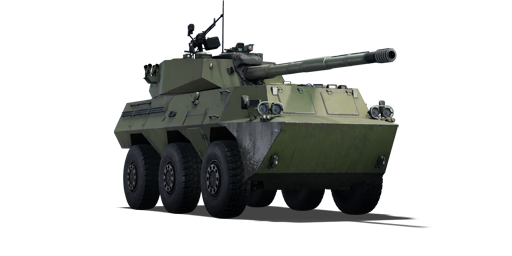The PTL02 (Simplified Chinese: PTL02 轮式突击炮; lit. wheeled assault gun) is the first wheeled assault gun in PLAGF service as part of the modernization and mechanization of PLAGF by the late 1990s. The plans for a wheeled assault gun sprung up after seeing the performance of Coalition forces during the game-changing Gulf War when French AMX-10RC utilized the road network to assault Iraqi forces; before the Gulf War, PLAGF was testing the possibility to built such vehicles with the new WZ551 chassis based on Sino-German product from NORINCO Factory 256, two such vehicles were built under different caliber (smoothbore 100 mm and rifled 105 mm respectively); while the duo didn't make it into official development, the advances in technology in national defense industry and possible landing operations gave the second chance for the 100 mm prototype to utilize the extensive road network of enemies. The result of the 1997 version assault gun became what is now known as the PTL02 certified in October 2001 and was first publicly shown during National Day parade in 2009 as part a fire-support platform for artillery troops, while another prototype with 105 mm gun might likely been developed into the export-only WMA301.
Introduced in Update "Ixwa Strike" as Chinese's first wheeled assault gun in-game, the PTL02 is based on the WZ551 6x6 chassis developed in early 1990s shared with the ZSL92 armoured personnel carrier. Having subpar speed compared to contemporary wheeled vehicles (at 85 km/h on road) and paper-thin protection, it might not be a first rate flanker like the Centauro or Rooikat Mk.1D. It is still significantly faster than most other PLAGF/ROCA tracked vehicles. Armed with a high velocity 100 mm smoothbore anti-tank gun, its stock APFSDS can penetrate 220 mm of flat RHA at point-blank range and its unlockable DYW PT-86-100 APFSDS boasts up to 381 mm of penetration. This vehicle has thermal sights with acceptable resolution in addition to a laser rangefinder, which can be precious at its BR since they significantly speed up the seek and destroy process. The PTL02 is less forgiving than other wheeled light tanks, but despite its shortcomings in armour, it still offers valuable scouting and flanking abilities that complement other Chinese vehicles well.















